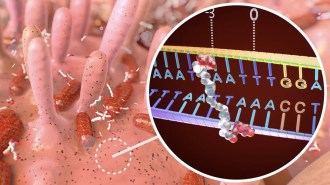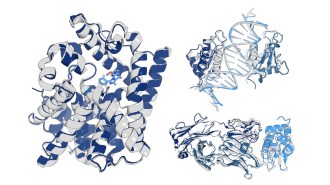
QUICK FREEZE? Some scientists think hot water can freeze faster than cold under certain conditions. New research proposes that the effect could be due to the properties of hydrogen bonds, but other scientists have failed to observe the purported effect.
StudioNeosiam/Shutterstock
- More than 2 years ago
It seems logical to expect cold water to freeze faster than hot, but some experiments have suggested the opposite. There’s now a new explanation for why hot water might freeze faster than cold under certain conditions. The phenomenon, known as the Mpemba effect, may be due to the properties of the bonds that link up neighboring water molecules, a team of chemists reports. Yet other researchers contend that the effect doesn’t exist at all.
References to quick-freezing hot water date back to the early days of science: Aristotle reported observing hot water freezing faster than cold. In the 1960s, a Tanzanian student named Erasto Mpemba noticed that ice cream solidified faster when put into the freezer steaming hot. Scientists have proposed a variety of explanations for the phenomenon — now named for the student — including the effects of evaporation, convection currents, and dissolved gasses or other impurities present in the water. But none of the explanations have been fully accepted.
In a paper published online December 6 in Journal of Chemical Theory and Computation, scientists propose that hydrogen bonds, the links formed between hydrogen atoms and the oxygen atoms of neighboring water molecules, could be part of the puzzle. Dieter Cremer of Southern Methodist University in Dallas and colleagues studied the strengths of hydrogen bonds in simulations of clusters of water molecules. “We see that hydrogen bonds change when warming up water,” says Cremer. The strength of hydrogen bonds depends on the arrangements of nearby water molecules. In simulations of cold water, both weak and strong hydrogen bonds were observed, but in higher temperature simulations, a larger percentage of the hydrogen bonds were strong, because “the weaker ones are broken to a large extent,” Cremer says.
Cremer and colleagues realized their new understanding of hydrogen bonds could explain the Mpemba effect. As water is heated, weaker bonds break, and groups of molecules form into fragments that can realign to form the crystalline structure of ice, serving as a starting point for the freezing process. For cold water to rearrange in this way, weak hydrogen bonds first have to be broken.
“The analysis in the paper is very well done,” says chemist William Goddard of Caltech. “The big question is, ‘Does it actually relate directly to the Mpemba effect?’” Although the researchers noted an effect that could cause the phenomenon, they didn’t simulate the freezing process and show that it proceeds faster when the new hydrogen bonding insights are included. “It doesn’t actually make the final connection,” Goddard says.
The new explanation might be added to the list of unconfirmed reasons for the effect — depending on whom you ask. Physicist Jonathan Katz of Washington University in St. Louis says the idea “just makes absolutely no sense.” In Mpemba experiments, the water freezes over a period of minutes or hours. As the temperature drops over that period of time, weak hydrogen bonds would reform and molecules would rearrange, Katz argues.
Meanwhile, researchers are still debating whether the effect is even real. Attempts to observe the Mpemba effect have been inconsistent, with scientists struggling to produce it in a repeatable way (SN Online: 3/23/10). In experiments published November 24 in Scientific Reports, scientists measured the time for hot and cold samples of water to cool to zero degrees Celsius. “No matter what we did, we could not observe anything akin to the Mpemba effect,” says Henry Burridge of Imperial College London.
However, that study “excluded a very important aspect of the phenomenon,” chemist Nikola Bregović of the University of Zagreb in Croatia wrote in an email. Burridge’s study observed only the time to reach the temperature at which water freezes, not the initiation of freezing itself — a complex process that is difficult to control, and one of the reasons the effect is so hard to verify. “I am still convinced that hot water can freeze more quickly than cold water,” Bregović wrote.
Editor’s note: This story was updated January 24, 2017, to delete the descriptor of the hydrogen bonds — they are not true chemical bonds — and to correct the implication that everyone on Henry Burridge’s team is from Imperial College London.






